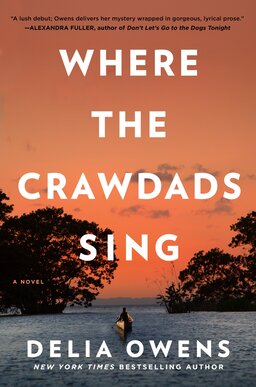When Chase
Andrews, well-known in the coastal North Carolina town of Barkley Cove, is found
dead in 1969, suspicion falls on Kya Clark, an infamous loner dubbed the “marsh
girl.” Abandoned by most of her family and forced to care for her abusive
father until his presumed death, Kya grows up with no formal education or social
graces but plenty of self-reliance and awareness of her habitat. Tate Walker, a
friend of her brothers, teaches her how to read and write, but their budding
relationship ends when he departs for college. This leaves her open to the
advances of Chase, a popular athlete, and puts them on a collision course that
will alter their lives forever.
Delia Owens’
wildly popular 2018 novel blends murder mystery, natural history, and coming-of-age
tale, a combination enticing to a broad spectrum of readers. That said, Where
the Crawdads Sing is at its best as an exploration of time and, especially,
place. North Carolina settings are often confined to Appalachia, but here,
Owens, a Georgia-bred zoologist, gives us an immersive look at the state’s
coastal marshes and the diverse life therein.
Unfortunately,
the rest of the novel is marred by contrivance and wretched characterization. The
“simp” label may be flung heedlessly by misogynists, and yet here, it fits Tate
to a tee. He’s a Dream Boy of the Kindly Nerdy rather than Manic Pixie variety,
but his existence seemingly revolves around supporting/appeasing Kya just the
same. Chase, for his part, is so transparently and predictably dishonest and
sleazy that he effectively robs the book of much of its suspense. Of course, he
still gets more development than Jumpin, at times Kya’s only enduring friend
and an exercise in racially crude tokenism.
All of
these examples suggest that Owens can’t write male characters, but it’s more
apt to suggest that she can’t write believable characters, period. Kya herself
is wildly improbable. Could an unschooled loner be a lot sharper than
judgmental town folk give her credit for? Absolutely. Could the same unschooled
loner make the leap to highly accomplished writer/artist/naturalist in her
early 20s? Give me a break.
Then
again, this is not the type of book to let plausibility get in the way of
hammering home trite themes. At one point, Kya’s lawyer harangues a jury about
judging those who are different in a way that echoes store brand Atticus Finch,
but his sermonizing is at least given context. The same cannot be said for
heavy-handed dialogue.
Where
the Crawdads Sing
is a deeply flawed book that turns what should be a sympathetic character into
a cartoon and squanders its beautifully rendered setting in order to tell us, often
very unartfully, what we’ve already heard before.

No comments:
Post a Comment